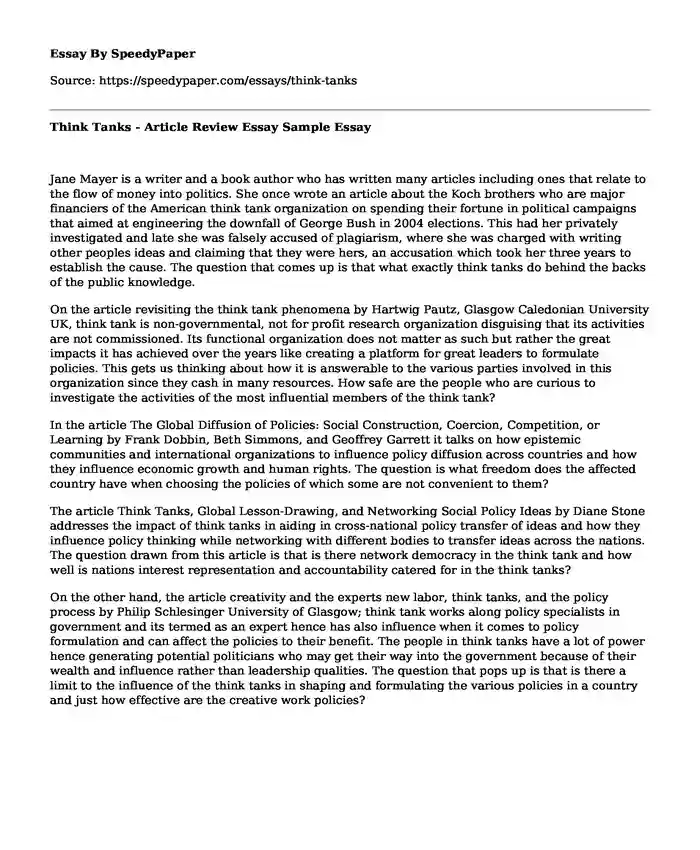Jane Mayer is a writer and a book author who has written many articles including ones that relate to the flow of money into politics. She once wrote an article about the Koch brothers who are major financiers of the American think tank organization on spending their fortune in political campaigns that aimed at engineering the downfall of George Bush in 2004 elections. This had her privately investigated and late she was falsely accused of plagiarism, where she was charged with writing other peoples ideas and claiming that they were hers, an accusation which took her three years to establish the cause. The question that comes up is that what exactly think tanks do behind the backs of the public knowledge.
On the article revisiting the think tank phenomena by Hartwig Pautz, Glasgow Caledonian University UK, think tank is non-governmental, not for profit research organization disguising that its activities are not commissioned. Its functional organization does not matter as such but rather the great impacts it has achieved over the years like creating a platform for great leaders to formulate policies. This gets us thinking about how it is answerable to the various parties involved in this organization since they cash in many resources. How safe are the people who are curious to investigate the activities of the most influential members of the think tank?
In the article The Global Diffusion of Policies: Social Construction, Coercion, Competition, or Learning by Frank Dobbin, Beth Simmons, and Geoffrey Garrett it talks on how epistemic communities and international organizations to influence policy diffusion across countries and how they influence economic growth and human rights. The question is what freedom does the affected country have when choosing the policies of which some are not convenient to them?
The article Think Tanks, Global Lesson-Drawing, and Networking Social Policy Ideas by Diane Stone addresses the impact of think tanks in aiding in cross-national policy transfer of ideas and how they influence policy thinking while networking with different bodies to transfer ideas across the nations. The question drawn from this article is that is there network democracy in the think tank and how well is nations interest representation and accountability catered for in the think tanks?
On the other hand, the article creativity and the experts new labor, think tanks, and the policy process by Philip Schlesinger University of Glasgow; think tank works along policy specialists in government and its termed as an expert hence has also influence when it comes to policy formulation and can affect the policies to their benefit. The people in think tanks have a lot of power hence generating potential politicians who may get their way into the government because of their wealth and influence rather than leadership qualities. The question that pops up is that is there a limit to the influence of the think tanks in shaping and formulating the various policies in a country and just how effective are the creative work policies?
Cite this page
Think Tanks - Article Review Essay Sample. (2019, Nov 20). Retrieved from https://speedypaper.net/essays/think-tanks
Request Removal
If you are the original author of this essay and no longer wish to have it published on the SpeedyPaper website, please click below to request its removal:
- Factory Farming Essay Example for Students
- Free Essay on Organizational Behavior
- Organizational Change in Shell Oil Company, Free Essay in Management
- Essay Sample Describing the Two Early Childhood Curriculum
- What Do We Know about Democratization after Twenty Years? Barbara Geddes Article Review
- Book Review of The Conquest of the Incas by John Hemming, Free Essay
- Paper Example: Trade and Absolute. Comparative Advantages
Popular categories





